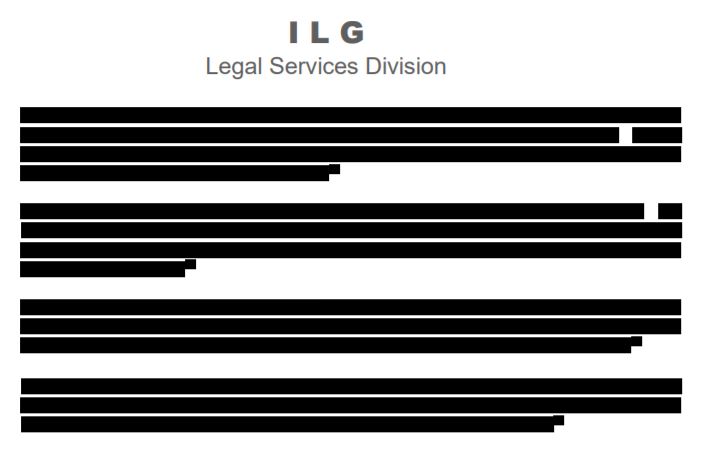By Jeffrey A. Roberts
CFOIC Executive Director
Applying a seldom-used provision in the Colorado Open Records Act (CORA), Denver Public Schools has asked a judge to determine whether it can disclose redacted portions of an outsider investigator’s report on sexual misconduct allegations against school board member Tay Anderson.
DPS blacked out multiple paragraphs of the 96-page Investigations Law Group (ILG) report it released last month after Anderson asserted “privacy interests” about his time as president of Never Again Colorado, a youth anti-gun violence group.

On Tuesday, following CORA requests from The Denver Post and The Denver North Star, DPS filed a lawsuit in Denver District Court claiming it “is unclear whether the unredacted portions of the Report sought by the news agencies is a ‘public record’ under CORA” and “it is unclear whether Director Anderson’s privacy interest would operate to limit access under these specific circumstances.”
“CORA is silent as to this type of investigative report and there is limited judicial precedent in Colorado on this issue,” wrote DPS Deputy General Counsel Aaron Thompson. The Denver school board, the lawsuit adds, “originally intended to release Section G.2 because the Board had committed to transparency wherever legally permitted. However, in an abundance of caution, the Board agreed to redact section G.2 and submit the matter to this Court for review.”
Under CORA, government records custodians may not deny a request for public records unless a specific exemption in the law permits the withholding of that record. But CORA also lets records custodians seek a judicial clarification if they cannot, in good faith, figure out whether the disclosure of certain records is prohibited. A records requester cannot recover attorney fees if the court finds that the custodian truly was unable, without a court ruling, to determine whether public disclosure is not allowed under the law.
The ILG report found that that the most serious allegations against Anderson could not be substantiated, but Anderson’s fellow school board members censured him for flirting with students on social media and making social media posts that could be perceived as intimidating witnesses in the investigation, according to Chalkbeat Colorado.
The lawsuit says Anderson asked for the redactions in Section G.2 because that portion pertains to alleged incidents during a time “when he was neither a DPS employee or an elected member of its Board of Directors. The section also relates to a period of time that Director Anderson was not yet an adult and references numerous other minors who would be substantially impacted by public disclosure.”
Thompson quoted from a 1998 Colorado Court of Appeals ruling, Freedom Newspapers, Inc. v. Tollefson, which laid out what a court must consider in determining whether the disclosure of records would cause substantial injury to the public interest by invading an employee’s constitutional right to privacy: (1) whether the individual has a legitimate expectation of nondisclosure; (2) whether there is a compelling public interest in access to the information; and (3) where the public interest compels disclosure of otherwise protected information, how disclosure may occur in a manner least intrusive with respect to the individual’s right of privacy.
“While an individual’s expectations of privacy are legitimate, so too is the public’s interest in accessing the information,” the lawsuit says. “There has been intense public interest in the (ILG) report. There have been dozens of news articles, public comments at the Board of Education meetings, press conferences, and robust social media discussion.”
The Denver Post and The Denver North Star are named in the lawsuit because they made CORA requests for the unredacted version of the report.
Denver North Star editor and publisher David Sabados told the Colorado Freedom of Information Coalition he was “not looking for the names of minors. There’s stuff that’s redacted for good reason.” But major portions seem to have been blacked out, he said, simply because Anderson asked for the redactions, “and I couldn’t really find any basis for that.”
“The whole purpose in my mind of the open records laws, at the state or federal level, is because the public has a right to know. And this is looking into the conduct of an elected official.”
Even if the allegations of misconduct predate Anderson’s time on the school board, “are we going to say that everything an elected official did prior to being sworn into office isn’t something we need to talk about? I think that would be a pretty strange line to draw.”
“I’m not comparing Director Anderson to the former president, but can you imagine if we’re like, ‘Oh sure, Donald Trump’s conduct toward women before he was in office isn’t relevant because he’s president now.’ That’s a pretty preposterous line to draw … but that’s the kind of line they’re drawing here.”
Follow the Colorado Freedom of Information Coalition on Twitter @CoFOIC. Like CFOIC’s Facebook page. Do you appreciate the information and resources provided by CFOIC? Please consider making a tax-deductible donation.




